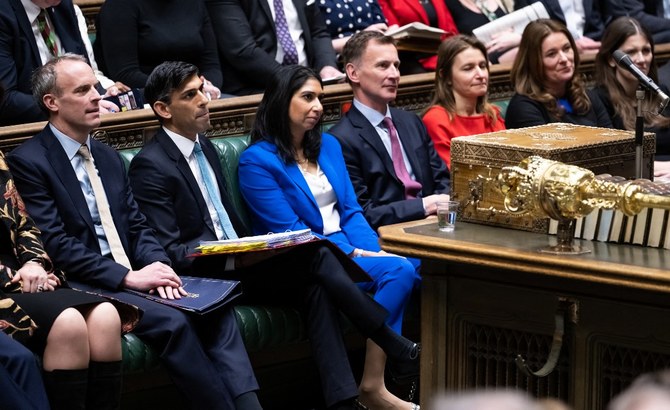Yossi Mekelberg
There was a sense of inevitability about the end of the political career, at least for now, of Dominic Raab, Britain’s deputy prime minister and justice minister. For months, if not years, stories about his aggressive style of managing the governmental departments he was in charge of circulated on the Westminster village rumor mill. They were eventually referred to an independent investigator, Adam Tolley, who produced a detailed and very unflattering report on Raab’s behavior. Tolley concluded that Raab had acted in an “intimidating” and “aggressive” way toward officials that amounted to bullying.
From there on, there were two options: for Prime Minister Rishi Sunak to sack Raab or for the latter to do the honorable thing and resign. To the relief of Sunak, his colleague last month chose to leave of his own accord – sort of – and saved himself the additional ignominy of being given his marching orders. However, Raab then wasted whatever was left of his shattered dignity by attacking civil servants and claiming that they were out to get him.
To the bitter end, Raab showed no sense of self-reflection, remorse or humility. This episode is a perfect summation of the state of the governing Conservative Party and it further adds to the general malaise in British society. So many Britons are utterly dismayed at the government’s incompetence, which ranges from its inability to curb the damaging cost-of-living crisis it has inflicted on the country to its flawed evacuation of British nationals from war-torn Sudan. And they are equally appalled by the government’s lack of integrity and decency.
As disturbing and concerning as this case of bullying by a senior member of the Cabinet may be, it is only a symptom of the latest edition of a Conservative government that is at a loss about taking any action in response to the mounting challenges the country is facing, while it is also tainted by corruption and the arrogance of power. This is typically the sign of a party that has been in power too long and has run out of ideas.
The Sunak government is barely six months old, but Raab’s is already the third Cabinet departure for questionable behavior. Gavin Williamson, a close ally of the prime minister, resigned last year after a string of allegations over his bullying conduct and other misdemeanors. And Nadim Zahawi, the Tory party chairman and former chancellor, was sacked earlier this year for failing to convincingly explain his tax affairs. Considering that the conduct and finances of Sunak (another recent chancellor) are also currently under official investigation, good governance appears to be extremely questionable in this government.
The more I look at the current state of British politics, the more it reminds me of the time leading up to the 1997 general election and the subsequent decisive victory of Tony Blair’s Labour Party. Back then, on one side of the dispatch box was a tired Tory government that a few years earlier had disposed of the charismatic and powerful Prime Minister Margaret Thatcher, but above all it was a divided party haunted by its inability to put to rest its deep divisions over EU membership. One corruption scandal followed another and the government of John Major became more and more detached from the realities and concerns of ordinary people. Now, a quarter of a century later, the third Conservative prime minister in as many years, who was selected by his party but not the people, barely enjoys any credibility following the disastrous spell in 10 Downing Street of Boris Johnson, who managed to obliterate his own 2019 electoral success, and the devastating 46 days in office of Liz Truss that trashed the UK economy – a disaster for which the British people will be paying for years to come.
The date for the next general election is still unknown, but it cannot be held later than mid-December 2024, which is a long time for a lame duck prime minister and his incompetent Cabinet to see out in the face of the mounting challenges the country is facing, especially while the Conservative Party is still at war with itself. While the rancor among the Tories, who remain divided over Europe, might subside somewhat, it is painfully obvious that none of the promises of a post-Brexit paradise made by Johnson and company will ever come good. Instead, shortages of goods are common and inflation is persistently above 10 percent, resulting in constant hikes in interest rates that are hitting homeowners and businesses very hard. There is something deceptive even in this worrisome figure, as prices of basic foodstuffs have rocketed even higher, some by as much as 100 percent, hitting low-income families the hardest, as is the case with the phenomenal increases in energy prices. Government spokespeople keep blaming all this on the COVID-19 pandemic or the war in Ukraine, while conveniently ignoring that, last month, inflation in the eurozone stood at 6.9 percent, while in the US it stood at 5 percent, which suggests that, in the UK, at least some of the problem is homegrown and is down to Brexit and the subsequent actions – or inaction – of the government.
People being forced into poverty, or at least struggling to make ends meet, is one side of the cost-of-living crisis, while on the other side are the continuing widespread strikes by public sector workers, including those in health, education and transport, which are adding to the daily misery of Britain in 2023. In response, the government seems to be out of sorts. As a result, pollsters are putting Labour 18 points ahead of the Tories. And there are also signs that a clear majority of Britons regret leaving the EU, which a small but influential number of Conservatives had wanted for decades. A recent YouGov survey suggests that 55 percent of the British people believe it was wrong to leave and only 32 percent still think it was right. This might play a major role in the next election, as will the fact that most people support the current round of strikes, despite the inconvenience they cause, out of sympathy with the hardships so many of the workers are having to endure.
For now, it is understandable for Labour to be cautious about introducing a radical agenda so far ahead of the next election, even though the Tories are doing so much to make themselves unelectable, as was the case in 1997. Nevertheless, Labour will pretty soon have to up its game and reveal its cards, offering a coherent agenda and a route out of the mess it will inherit from its predecessor. And if it wants to emulate the Labour class of 1997, it will have to hit the ground running with a bold, grand plan fit for the 21st century, because the public is clearly ready for a fresh start – and the sooner the better.







